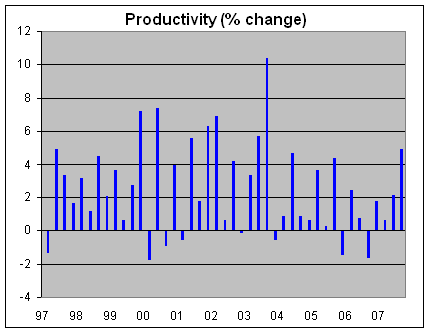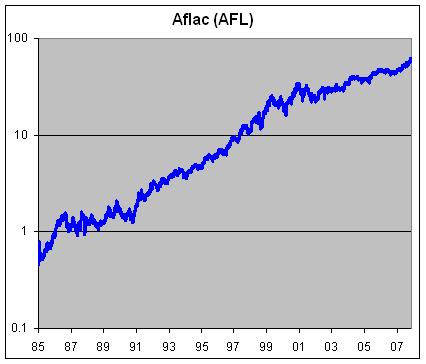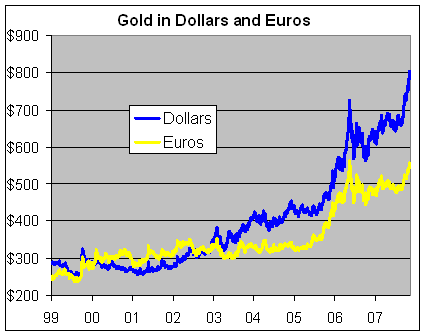Archive for 2007
-
Productivity Soars
Eddy Elfenbein, November 7th, 2007 at 11:03 amProductivity grew 4.9% last quarter, the most in four years. Basically, people are producing more and working less. The good news is the higher productivity can help keep inflation down.

-
The Good Side of the Subprime Mess
Eddy Elfenbein, November 7th, 2007 at 7:25 amI don’t agree with everything here, but George Schultz and John Taylor make some interesting points about the silver lining in the subprime cloud:
Including both the direct investment effect and the personal saving effect, about three-quarters of the reduction in the current account deficit can be attributed to the housing market turmoil. So while the agreed economic policies have begun to improve the current account, and will continue to do so, they have had important assistance. The housing market correction has been an important factor in the current account correction; as a result we are seeing a dramatic beginning of a welcome rebalancing of the world’s investment and saving flows.
-
GM Takes $39 Billion Charge
Eddy Elfenbein, November 7th, 2007 at 7:01 amI think GM’s restructuring needs restructuring. The company announced that it’s taking a $39 billion noncash charge in the third quarter to remove net deferred tax assets from its books.
The NYT:G.M. said the charge, which affects the automaker’s businesses in the United States, Germany and Canada, would have no impact on operations and would not interfere with efforts to restructure.
But analysts said the step reflected the likelihood that G.M. would not earn significant profits on its automotive or finance operations in the near future. The deferred assets could have been used to offset taxes on future profits.
“What this says right now is that, at least according to an accounting interpretation, the outlook for earnings in their U.S. business has diminished from where it was,” said John Casesa, an industry analyst with the Casesa Shapiro Group.
The charge is among the largest by the auto company and is the latest in a series of accounting steps at G.M. The company has revised its financial results often over the last few years as it has worked through a restructuring that began in 2005.Let’s run the numbers: $39 billion and GM has 565.9 million shares outstanding. The current Dow divisor is 0.123017848. So 39,000,000,000 divided by 565,900,000 divided by 0.123017848 equals roughly 560.
GM’s charge is worth 560 Dow points.
Think about that. -
Cramer Eats Skin Cream
Eddy Elfenbein, November 7th, 2007 at 6:41 amIf TV didn’t exist, I think he’d go door to door.
-
ValleyWag: Why Apple Will Be Bigger Than Google
Eddy Elfenbein, November 6th, 2007 at 4:14 pmThe nonrelease of the Googlephone just highlights what Apple gets about consumers, and what Google doesn’t. Apple knows how to design not just gadgets, but the businesses that go around them. And as a result, I wouldn’t be surprised if Apple is worth more than Google within two years.
Google has a market cap of $230 billion and Apple checks in at $167 billion, so it’s really not that outrageous a claim.
ValleyWag lists the reasons:First, Apple makes a profit when the phone is sold — about $200. Second, it takes a hefty chunk of subscription revenue from the carrier — $18 a month, or $432 over two years. Third, Apple takes a cut from music and television shows sold through the iTunes Store — and, possibly, it will take a cut of sales of third-party software applications as well.
The hardware profits are likely here to stay. Apple has been hugely successful in driving down costs and keeping margins up. For the most part, Apple doesn’t really lower prices. Its top of the line laptop has been in the $2,000-$2,500 range for years. Those $500 pieces of crap at Wal-Mart? Those are last year’s computers being sold as new. Apple doesn’t do that, so they keep their margins fat and juicy.
The same thing happened with the iPod. When it debuted in October 2001, the iPod was $399. For years the top of the line iPod remained around that price. Only more recently, with the advent of cheap flash drives — Apple spent $1.2 billion to snatch a huge percentage of the worldwide supply of it — has it been able to drive down the average cost of iPods. As a result, Apple has sold millions upon millions of the music players, taking a huge market share and laughing all the way to the bank. -
Not All Financial Stocks Are Getting Clobbered
Eddy Elfenbein, November 6th, 2007 at 2:56 pmHere’s 25 years of Aflac (AFL):

The duck stock has returned over 21% for a quarter of a century. What’s most impressive is how consistent the stock has been. That’s a total return of more than 130-fold! -
Nicholas Financial’s Earnings
Eddy Elfenbein, November 6th, 2007 at 2:29 pmNicholas Financial (NICK) is getting slammed in today’s trading. The company just reported a profit of 25 cents a share compared with 27 cents last year. Digging down into the decimals, that’s a decline of 6.5%.
Not surprisingly, the difficult credit environment has been hard on NICK. The company’s provision for credit losses grew by 90% over last year. Still, we’re talking about a portfolio that has a pre-tax yield of nearly 9%.
The shares are currently down 4.3% today, and they’re off more than 33% for the year. I won’t even hazard a guess as to what NICK will make for next year but I don’t see much more risk here. The shares are currently going for about seven times trailing earnings.
Here are some stats on NICK from Seeking Alpha. -
The Price of Gold in Dollars and Euros
Eddy Elfenbein, November 6th, 2007 at 12:52 pm
The rise in gold isn’t all about the dollar going down, although that’s certainly helped. -
Soros Sees Gloom and Doom
Eddy Elfenbein, November 6th, 2007 at 9:39 amGeorge Soros is out there predicting again. Of course, he’s famous for breaking the Bank of England in 1992 and making a cool billion in the process. So perhaps he’s worth listening to.
This time, Soros sees bad news for the United States. Very bad news.Billionaire investor George Soros forecast on Monday that the U.S. economy is “on the verge of a very serious economic correction” after decades of overspending.
“We have borrowed an awful lot of money and now the bill is oming to us,” he said during a lecture at the New York University, also adding that the war on terror “has thrown America out of the rails.”
Asked whether a recession was inevitable, Soros said: “I think we are definitely in for a slowdown that I think will be a bigger slowdown than (Fed Chairman Ben) Bernanke is seeing.”
Famous for his speculative attack on the Bank of England that made him more than $1 billion, Soros declined to nominate which currencies are more vulnerable currently. He also declined to comment specifically on the dollar.
“I know exactly where the currencies are going to but I’m not going to tell that to you,” he told the audience.According to Soros, we’re on the verge of a recession. Maybe, but I’m a bit skeptical. Soros said the same thing last year, and a recession didn’t come about. In fact, economic growth has accelerated for the past two quarters. Nine years ago, Soros said that the global capitalist system “is coming apart at the seams,” yet this could be the strongest world economy ever seen.
Still, if you constantly predict awful news, sooner or later, you’re going to be right. In my book, the doomdayers need to work on their timing. -
Mark Sellers at Harvard
Eddy Elfenbein, November 5th, 2007 at 5:11 pmFascinating talk. It’s a big long but well worth it. Here’s a sample:
I know that everyone in this room is exceedingly intelligent and you’ve all worked hard to get where you are. You are the brightest of the bright. And yet, there’s one thing you should remember if you remember nothing else from my talk: You have almost no chance of being a great investor. You have a really, really low probability, like 2% or less. And I’m adjusting for the fact that you all have high IQs and are hard workers and will have an MBA from one of the top business schools in the country soon. If this audience was just a random sample of the population at large, the likelihood of anyone here becoming a great investor later on would be even less, like 1/50th of 1% or something. You all have a lot of advantages over Joe Investor, and yet you have almost no chance of standing out from the crowd over a long period of time.
And the reason is that it doesn’t much matter what your IQ is, or how many books or magazines or newspapers you have read, or how much experience you have, or will have later in your career. These are things that many people have and yet almost none of them end up compounding at 20% or 25% over their careers.
- Tweets by @EddyElfenbein
-
-
Archives
- September 2024
- August 2024
- July 2024
- June 2024
- May 2024
- April 2024
- March 2024
- February 2024
- January 2024
- December 2023
- November 2023
- October 2023
- September 2023
- August 2023
- July 2023
- June 2023
- May 2023
- April 2023
- March 2023
- February 2023
- January 2023
- December 2022
- November 2022
- October 2022
- September 2022
- August 2022
- July 2022
- June 2022
- May 2022
- April 2022
- March 2022
- February 2022
- January 2022
- December 2021
- November 2021
- October 2021
- September 2021
- August 2021
- July 2021
- June 2021
- May 2021
- April 2021
- March 2021
- February 2021
- January 2021
- December 2020
- November 2020
- October 2020
- September 2020
- August 2020
- July 2020
- June 2020
- May 2020
- April 2020
- March 2020
- February 2020
- January 2020
- December 2019
- November 2019
- October 2019
- September 2019
- August 2019
- July 2019
- June 2019
- May 2019
- April 2019
- March 2019
- February 2019
- January 2019
- December 2018
- November 2018
- October 2018
- September 2018
- August 2018
- July 2018
- June 2018
- May 2018
- April 2018
- March 2018
- February 2018
- January 2018
- December 2017
- November 2017
- October 2017
- September 2017
- August 2017
- July 2017
- June 2017
- May 2017
- April 2017
- March 2017
- February 2017
- January 2017
- December 2016
- November 2016
- October 2016
- September 2016
- August 2016
- July 2016
- June 2016
- May 2016
- April 2016
- March 2016
- February 2016
- January 2016
- December 2015
- November 2015
- October 2015
- September 2015
- August 2015
- July 2015
- June 2015
- May 2015
- April 2015
- March 2015
- February 2015
- January 2015
- December 2014
- November 2014
- October 2014
- September 2014
- August 2014
- July 2014
- June 2014
- May 2014
- April 2014
- March 2014
- February 2014
- January 2014
- December 2013
- November 2013
- October 2013
- September 2013
- August 2013
- July 2013
- June 2013
- May 2013
- April 2013
- March 2013
- February 2013
- January 2013
- December 2012
- November 2012
- October 2012
- September 2012
- August 2012
- July 2012
- June 2012
- May 2012
- April 2012
- March 2012
- February 2012
- January 2012
- December 2011
- November 2011
- October 2011
- September 2011
- August 2011
- July 2011
- June 2011
- May 2011
- April 2011
- March 2011
- February 2011
- January 2011
- December 2010
- November 2010
- October 2010
- September 2010
- August 2010
- July 2010
- June 2010
- May 2010
- April 2010
- March 2010
- February 2010
- January 2010
- December 2009
- November 2009
- October 2009
- September 2009
- August 2009
- July 2009
- June 2009
- May 2009
- April 2009
- March 2009
- February 2009
- January 2009
- December 2008
- November 2008
- October 2008
- September 2008
- August 2008
- July 2008
- June 2008
- May 2008
- April 2008
- March 2008
- February 2008
- January 2008
- December 2007
- November 2007
- October 2007
- September 2007
- August 2007
- July 2007
- June 2007
- May 2007
- April 2007
- March 2007
- February 2007
- January 2007
- December 2006
- November 2006
- October 2006
- September 2006
- August 2006
- July 2006
- June 2006
- May 2006
- April 2006
- March 2006
- February 2006
- January 2006
- December 2005
- November 2005
- October 2005
- September 2005
- August 2005
- July 2005
 Eddy Elfenbein is a Washington, DC-based speaker, portfolio manager and editor of the blog Crossing Wall Street. His
Eddy Elfenbein is a Washington, DC-based speaker, portfolio manager and editor of the blog Crossing Wall Street. His